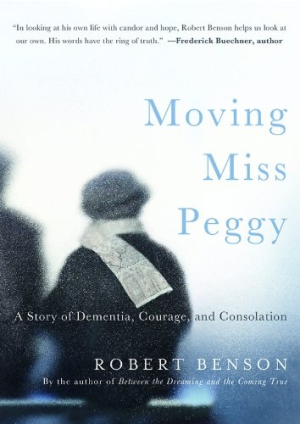
Moving Miss Peggy
A Story of Dementia, Courage, and Consolation
A loving and sometimes painful story of siblings who must answer the question of what to do about mother.
Robert Benson’s account of his and his siblings’ efforts to move their dementia-addled mother into a comfortable, secure new living arrangement is an example of the memoir genre stretching itself to accommodate a seismic shift in generational intercourse—the one representing an age older than the world has ever known, and another, already past middle age, coping with complicated care decisions for their parents.
Readers are likely to see more nonfiction material in this category, and more, too, the length of Benson’s—only 163 pages, with rivers of white space between lines. The slim memoir is having a moment, and in many ways that’s a good thing—less being more when in the hands of a skilled prose craftsman like Benson.
In Moving Miss Peggy, Benson adopts an arresting point of view: rather than telling the story from only his own perspective, he adopts a humbled version of the royal “we” and speaks from the group of his mother’s five adult children. Readers get a more expansive collective story, less overlaid by just one mother-child relationship.
Benson builds a portrait of a woman and mother of complexity as well as steadfastness: devoted to motherhood, adventurous in building a career after widowhood, kind and sensitive, compliant but determined. He makes clear that he loves and admires his mother; that he and his siblings did their best; that they struggled to make her happy, as well as safe; and, on a few occasions, did not always succeed on both counts soon or well enough. Yet they got it right when it counted. One gets the sense, though, that Benson has left out all ill-tempered disagreements and untoward discussions.
In places, the rich narrative tone gives way to practical discussion of eldercare issues, with tips and advice from lessons learned and mistakes made. There is a sense of earnestness in these sections, the author wanting to spare readers the pitfalls that make trying times worse. While these passages breathe with an open generosity, they take one out of an otherwise tight volume of lovely prose and thoughtfully constructed, essay-like chapters.
Eventually, Miss Peggy settles into assisted living, the siblings and grandchildren into new routines. Benson writes, “It is a small price to pay, whether we are taking her to the salon or picking up her groceries or sorting her mail. It will not be long before we will all wish we could pay such a price again and again, when we cannot.”
Reviewed by
Lisa Romeo
Disclosure: This article is not an endorsement, but a review. The publisher of this book provided free copies of the book to have their book reviewed by a professional reviewer. No fee was paid by the publisher for this review. Foreword Reviews only recommends books that we love. Foreword Magazine, Inc. is disclosing this in accordance with the Federal Trade Commission’s 16 CFR, Part 255.
